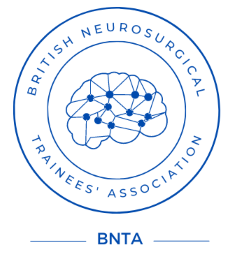Specialty Trainees
British Neurosurgical Trainees Association (BNTA)
British Neurosurgical Trainees Association (BNTA)

The British Neurosurgical Trainees Association (BNTA) represents the opinions of all trainees in Neurosurgery. It meets every 6 months during the biannual Society of British Neurosurgery meeting.
Details of these meetings can be found on the BNTA website.
The meetings are an opportunity to meet other trainees from around the UK and to provide a forum for discussion of any issues relevant to training that are raised. You can see the minutes from previous meetings on the BNTA website.
Outside of formal meetings, the BNTA communicates through an email list. Trainees are kept up to date with forthcoming training events, and the email group is a forum for discussion of ideas. If you want to join the group, please follow the links on the website. You must be a neurosurgical trainee and be invited by the moderator to join.
The BNTA committee provides representatives to a number of organsations, including ASiT, the neurosurgical SAC and the SBNS council. These positions are elected from within the BNTA and are voices of the trainee community. You can find out more about all these other roles from the website.
The website also carries up to date information on courses and fellowships, including the Codman BNTA neurosurgical fellowships
For more information check out the British Neurosurgical Trainees Association website.
BNTA Travel Award
BNTA Travel Awards
The BNTA Travel awards are currently open for application. The deadline to apply is 5pm on Friday 27th of October.
A reminder of the awards available:
1) The BNTA Extended travel Codman/Barrow award. FIVE awards of £2000 will be awarded. This is primarily aimed at senior trainees who have recently started their fellowship or are due to attend soon.
2) The BNTA Short travel Codman/Barrow award. THREE awards of £1000 will be awarded. Duration of travel for the short-travel award must not exceed one-month.
You must be a trainee to be eligible for application. Please contact the BNTA treasurer for further information and to obtain copies of the application forms: [email protected] (Ahmad Ali).
If you are a trainee and not a member of the BNTA, please register through the below link to receive a weekly newsletter on courses and other opportunities:

Rosa Sun
Subspecialty/ies: None
Role in SBNS council: BNTA chair
Other roles: Previous SAC representative (BNTA), ISCP neurosurgery trainee representative
Demographic information: Female, British Chinese
What was your journey that led you to SBNS council?
As the previous SAC and ISCP representative for BNTA, I saw myself as an advocate for trainees across the country in all matters relating to training, curriculum, exams and beyond. As a trainee body, we have faced turbulence within a short period of time, including COVID, the new curriculum, and junior doctor’s strikes. There are ongoing concerns regarding the post-CCT workforce crisis, access to funding, equality in training, loss of trainees from the NHS and the role of extended health care practitioners. Our BNTA survey captured the opinions and concerns from neurosurgical juniors training under this current climate. I applied for the role of BNTA chair with the intention of continuing my previous work, to bring an honest representation of these concerns to the SBNS, to raise awareness and to facilitate open dialogue.
What are your aims/contributions to SBNS council?
To act as liaison in bringing trainee opinions to SBNS council, particularly in relation to current issues faced by the trainee body. To identify discrepancies in equality, funding, training opportunities and to promote awareness and targeted response, through our group networks for academic, OOP and LTFT trainees. To facilitate emerging opportunities in global neurosurgery, SBNS bursaries, mentoring and training. I advocate for transparency and improved communication - progress has been made and exciting work is carried out nationally, often unbeknown to the trainees. I strongly believe in the importance of information exchange to improve national morale and full utilisation of available resources.
BNTA Committee
Chair - Rosa Sun
Secretary - Chloe Chia
Treasurer - Ahmad Ali
IT Rep - Oli Kennion
LTFT Rep - Anna Bjornson
Academic Rep - Callum Allison
SAC Rep - Daniel Thompson
EANS Rep - Ed Goacher
ASiT Reps - Soham Bandyopadhyay & Matt Sanders
Post-CCT Rep - Gopiga Thanabalasunduram
Non-NTN Rep -Tarek El-Moslemany
British Neurosurgical Trainee Research Collaborative (BNTRC)

Who are we?
The British Neurosurgical Trainee Research Collaborative is an initiative of the BNTA which is supported by the SBNS, the UK Neurosurgical Research Network and the Royal College of Surgeons of England.
What are our aims?
We aim to undertake high-quality neurosurgical research and in turn, help to ensure improved care and outcome for neurosurgical patients.
Who can join?
The BNTRC is open to all trainees/junior staff interested in undertaking high-quality neurosurgical research.
What are the benefits?
- Develop links with a research active network of neurosurgical trainees
and consultants - Become involved with large multi-centre research studies
- Participate in worthwhile research projects regardless of whether
you undertake out of programme research or not - Ensure you get the numbers you need for your study